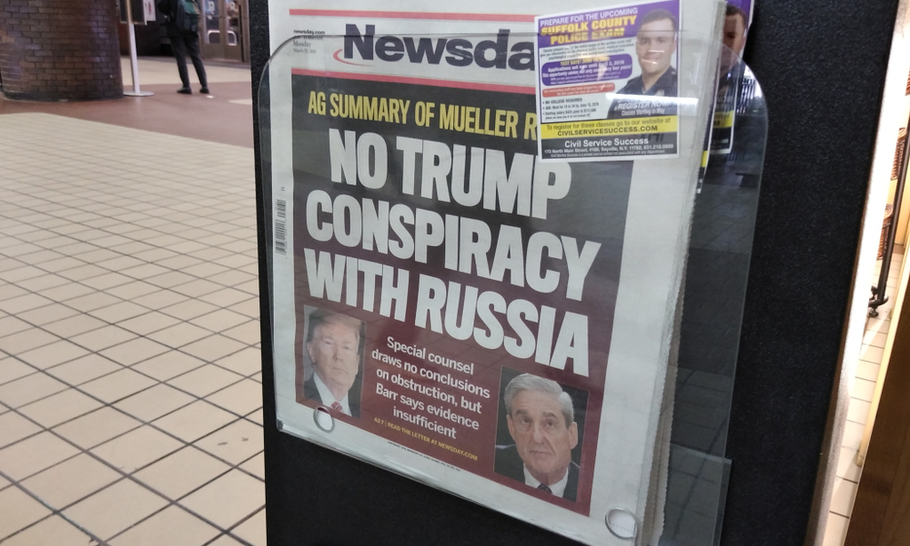Did Donald Trump’s presidency survive the Mueller Report?

Did the Mueller Report exonerate U.S. President Donald Trump?
This has been a perpetual topic of conversation since the slightly redacted 448-page Report on the Investigation into Russian Interference in the 2016 Presidential Election was released on April 18. (You can read it here.) The President’s supporters have declared Mueller’s findings to be a complete vindication against a left-wing establishment hell-bent on destroying his legacy. His opponents, however, believe the special counsel and former Federal Bureau of Investigation director’s report helped paved the way for Democrats to initiate impeachment proceedings.
The real answer lies somewhere in the middle.
The Mueller Commission exonerated Trump with respect to collusion with Russia to change the course of the 2016 presidential election. As the report specifically states, they “did not establish that members of the Trump Campaign conspired or coordinated with the Russian government in its election interference activities.” This confirms what the FBI and CIA have said in the past: Russia attempted to interfere in this election, but it did not involve Trump, his campaign team or any American citizen.
Nevertheless, Mueller left a gaping hole in his analysis. “Collusion is not a specific offense or theory of liability found in the United States Code, nor is it a term of art in federal criminal law,” he wrote. “For those reasons, the Office’s focus in analyzing questions of joint criminal liability was on conspiracy as defined in federal law.”
What does this mean? In a nutshell, while Trump was cleared from any real or perceived complicity with Russia, the allegation of collusion, which fuelled the Democratic party machine on overdrive for more than two years, was never part of the equation.
If you’re just a wee bit confused by this revelation, don’t feel too bad. You’re not alone.
But while Russian collusion fantasies are no longer on the table, the Special Counsel investigation left plenty of doubt about Trump with respect to obstruction of justice. The report outlined 10 potential instances of obstruction, including the President’s conduct with then-FBI director James Comey (asking him to let former National Security Advisor Michael Flynn go), the firing of Comey, his bizarre conduct and working relationship with former personal lawyer Michael Cohen, and attempts to bring down the Russia investigation.
The most unusual (and widely quoted) allegation of obstruction of justice apparently occurred when Trump first heard about Mueller being hired as the Special Counsel in May 2017. According to the report, “the President slumped back in his chair and said, ‘Oh my God. This is terrible. This is the end of my Presidency. I’m fucked.’” He then proceeded to demonise Mueller at times, and may have attempted to find ways to oust him from this position.
Unsurprisingly, there are two working theories on Trump’s remark. Opponents emphatically believe this statement proves his guilt, while supporters argue it shows concern that his presidential agenda would be bogged down or destroyed due the investigation. Both analyses are plausible, so take your pick.
It’s also worth pointing out that any characterisation of obstruction of justice is purely based on personal interpretation. What Mueller and his team of legal advisers perceived as obstruction could be viewed by others as a typical, sordid example of politicians playing footsie with the rules. It all depends on your level of tolerance, and how far you believe certain discussions and negotiations should go.
With respect to the political drama playing out in U.S. politics, how will Americans view the Mueller Report findings?
It goes without saying that virtually all of Trump’s supporters and opponents will remain firmly planted in their respective camps. They will either walk to the ends of the earth with this President, or wish he would disappear from public life. They will either accept his flaws, or despise his perceived motives. They will either continue to see him as a breath of fresh air in politics, or the biggest threat to U.S. democracy in history.
If there’s one certainty with Trump, it’s that he’s the ultimate black-and-white president. There are little to no shades of grey when it comes to his leadership, policies, behaviour and public statements.
That being said, this report will never disappear during Trump’s presidency. While collusion may have been discredited for the most part, the 10 separate allegations of obstruction of justice will continue to haunt him. The White House’s focus will be to consistently emphasize there was no collusion, and dismiss any further suggestions of obstruction. Whether this strategy will succeed during Trump’s presidential re-election bid remains to be seen.
Finally, there’s the (ahem) “little” matter of impeachment.
Senior Democrat leaders like Nancy Pelosi and Chuck Schumer don’t particularly favour this strategy, but they’re not going to necessarily stop the radical leftists in their party, like Alexandria Ocasio-Cortez, from initiating these proceedings.
They should, however.
While the Democrats control the House of Representatives, the Republicans control the Senate and won’t allow it to happen. No U.S. president has ever been impeached; Andrew Johnson and Bill Clinton were both impeached in the House and protected in the Senate, while Richard Nixon resigned before facing these proceedings. As well, polls consistently show that a majority of Americans don’t believe in removing Trump from office in this manner.
Hence, the Democrats would be wise to drop any discussion of impeachment due to the Mueller Report. Their best, and most legitimate, route to victory is to beat Trump in the 2020 U.S. presidential election. Yet, this task became far more difficult due to the very report that both helps and hinders his political future, and theirs.





